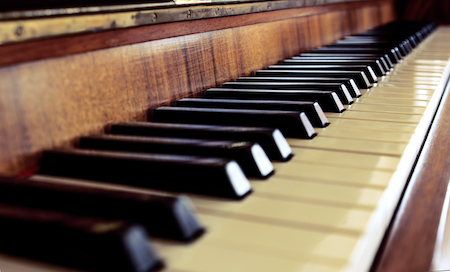Pianos aren’t something you keep in a faraway corner of the house. Pianos are often center stage in the most frequently used room. What better way to bring music to the center of attention. It’s a great way to keep it in your family’s lives.
Yet cleaning a piano can be a difficult chore. A soft microcloth can do wonders to keep the dust bunnies away. But what happens when your piano keys start yellowing? How do you whiten them in such a way as not to hurt the keys?
First step – determine if the piano keys are ivory or plastic
“Tickle the ivories” is a saying developed long ago when piano keys were still crafted from ivory. That practice has been illegal for decades, but if you have an antique piano handed down through the generations, you may still have a piano with ivory keys.
Depending on what your keys are made of determines how you can restore the look of your keys. Plastic keys are smoother than ivory. They usually are jointed at the base.
How to clean plastic or ivory piano keys
With both ivory and plastic, avoid using soap and water. If water seeps down between the keys, it can damage the inner workings enough to call in professional help.
Avoid using harsh chemicals when you clean. Most cleaning products on the market today will harm the finish and do more damage to the keys. When in doubt, stick with basics.
Always start with a soft cloth. Microfiber works well for a variety of cleaning needs. If you do use any liquid products, be sure to dab them onto the microfiber cloth before rubbing the keys. Liquid directly on a key spells disaster.
Natural over chemicals is also best. Dilute vinegar in water. A little milk on ivory keys can also be a good choice. Ivory is dental bone; using a child’s toothbrush can help you get to all surface areas and whiten them up.
For both types of keys, it’s important to clean one key at a time. Avoid rubbing the cloth over all keys at once – this is what can allow moisture to seep between the keys. Work back to front, allowing each key to dry thoroughly.
If you have questions, it’s best to seek professional guidance before you begin. We can help recommend the right cleaning tools for the job. We can also recommend a professional to help you with the task.
If it’s ivory, leave it alone
One final thought if you have yellowing ivory keys. Some people prefer them to age naturally, and consider yellow keys a part of the charm. This keeps the piano in age-appropriate condition, and may even add to the value.
If authenticity is important, consider speaking with an expert before you make any changes to your piano.


